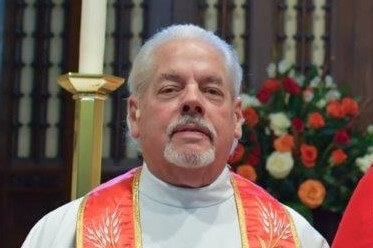As I was preparing an e-mail to send to our prayer team at Holy Cross Anglican Church, it occurred to me that we don’t see many requests for the salvation of others; most prayer requests are for illness or difficult situations. Important as the temporal needs of others are, surely there’s nothing so urgent, so important as the state of one’s soul, is there? Our Lord in Mark 8:6 asks the rhetorical question, “For what does it profit a man to gain the whole world and forfeit his soul?” So here are some thoughts on praying for those who do not know Jesus.
On the cross, Jesus took time to pray for those who were murdering Him. He prayed: “Father, forgive them; for they do not know what they are doing.” Bible teacher John McArthur points out that God began answering this prayer on the Day of Pentecost when some 3,000 people repented and were baptized in one day – people who were among the crowd accused by St. Peter of a horrible offense: “this Jesus, delivered up according to the definite plan and foreknowledge of God, you crucified and killed by the hands of lawless men. (Acts 2:23)
After concluding the sermon, we read: “Now when they heard this they were cut to the heart, and said to Peter and the rest of the apostles, “Brothers, what shall we do?” And Peter said to them, “Repent and be baptized every one of you in the name of Jesus Christ for the forgiveness of your sins, and you will receive the gift of the Holy Spirit.” (Acts 2:37, 38) And about 3,000 did.
This is not an exhaustive study, but please consider the following and ponder these truths.
What is your attitude toward those who are lost, who do not know the living Jesus but only know about Him?
St. Paul is our example. “Brothers, my heart’s desire and prayer to God for them [his fellow Jews] is that they may be saved.” (Rom. 10:1) He even went so far as to say in 9:3: “For I could wish that I myself were accursed and cut off from Christ for the sake of my brothers, my kinsmen according to the flesh.”
And, of course, the Lord Jesus Himself who describes the condition of those around him: “When he saw the crowds, he had compassion for them, because they were harassed and helpless, like sheep without a shepherd.” (Matt. 9:36)
It’s far too easy to look on those “pagans” around us with contempt, especially those with whom we may have serious disagreements over politics, social and moral issues. Perhaps it would help if we remind themselves of their real problem.
So – pray that God will give you a spirit of compassion toward those who do not know Jesus, on that, like Jesus, demonstrates it to all.
Do you understand their true condition?
One of the most common descriptions of non-Christians in the N.T. is summed up in the little word “lost.” Ever been lost? Jesus describes himself as the “good shepherd” who comes to “seek and to save the lost” (Luke 19:10), this following the astonishing conversion of Zacchaeus.
They are “blind.” Jesus constantly spoke of the spiritual blindness especially of Israel’s religious leaders whom He described as “blind guides of the blind.” (Matt. 15:14)
They are “without hope.” St. Paul reminds the believers in Ephesus of their past condition before they became followers of Jesus: “…remember that you were at that time separated from Christ, alienated from the commonwealth of Israel and strangers to the covenants of promise, having no hope and without God in the world.” (Eph. 2:12) That’s the bad news. The good news, the gospel is: “But now in Christ Jesus you who once were far off have been brought near by the blood of Christ.” (Eph. 2:13)
The list goes on, but you get the idea.
So, pray for those who do not know Jesus, that God will open their eyes to see their true condition, and that they will indeed stand before the Lord Jesus at the final judgment. Pray that the distractions and pleasures of this life will fade in importance and that like the prodigal son they will “come to their senses” and see the truth about themselves and the father’s gracious offer of salvation.
Do you understand the Enemy’s tactics?
The Enemy of our souls does not go around trying to get everyone to be bad. His masterpiece of all his lies is that “If you’ll do the best you can, you’ll ‘make the cut’ come judgment day.” He loves it when unbelievers become do-gooders. This is what lay at the heart of St. Paul’s anxiety regarding his fellow Jews. Going back to Romans 10 we read, “For I bear them witness that they have a zeal for God, but not according to knowledge. For, being ignorant of the righteousness of God, and seeking to establish their own, they did not submit to God’s righteousness.”
It’s brilliant. The Enemy will a) convince them they’re good enough to make the grade, like the Pharisee in Jesus’ parable in Luke 9 where we’re told that “He also told this parable to some who trusted in themselves that they were righteous….” (Luke 13:9) OR b) convince them they’re too bad, that it’s too late, that they are beyond hope. But Jesus said otherwise. For there in the Temple was a tax collector (a traitor) – considered the worst of sinners in Israel. Unlike the religious Pharisee, he “would not even lift up his eyes to heaven, but beat his breast, saying, ‘God, be merciful to me, a sinner!’ I tell you, this man went down to his house justified, rather than the other.” (Luke 18:13, 14)
So, for those you know; friends, family, etc. Pray for insight, that they will come to see the truth about themselves, that despite their perceived goodness, they are indeed sinners. Pray that if they’ve “hit bottom” they will not despair, that “where sin abounded grace did much more abound.” (Romans 5:20) If you know of specific obstacles between them and the Lord, make those matters of prayer as well.
Finally, this encouraging example from George Mueller of Bristol, England, a true prayer warrior if ever there was one. He ran an orphanage which he started and never, ever asked anyone for money. No fund-raisers, no government support. Yet he cared for over 10,000 orphans in his lifetime, established 117 schools which offered Christian education to more than 120,000.
One day George Muller began praying for five of his friends. After many months, one of them came to the Lord. Ten years later, two others were converted. It took 25 years before the fourth man was saved. Mueller persevered in prayer until his death for the fifth friend, and throughout those 52 years he never gave up hoping that he would accept Christ, which he did shortly after Mueller’s death.



